Intro
Discover carbohydrates in food sources, including whole grains, fruits, and vegetables, to understand their role in a healthy diet, glycemic index, and nutrient-dense benefits.
Carbohydrates are one of the most essential nutrients in our diet, providing energy for the body. They are found in a wide variety of foods, including grains, fruits, vegetables, and dairy products. Understanding the importance of carbohydrates and their sources is crucial for maintaining a healthy diet. Carbohydrates play a vital role in our daily lives, and their consumption has a significant impact on our overall health and well-being. In this article, we will delve into the world of carbohydrates, exploring their benefits, types, and food sources.
The human body relies heavily on carbohydrates as its primary source of energy. They are broken down into glucose, which is then used by the body's cells to produce energy. Carbohydrates also play a crucial role in maintaining healthy digestion, preventing constipation, and supporting the growth of beneficial gut bacteria. Moreover, carbohydrates are essential for the proper functioning of the brain, nervous system, and muscles. With the numerous benefits of carbohydrates, it is essential to consume them in the right amounts and from the right sources.
A balanced diet that includes a variety of carbohydrate-rich foods can provide numerous health benefits. Whole, unprocessed foods such as whole grains, fruits, and vegetables are rich in carbohydrates, fiber, and essential nutrients. These foods help to regulate blood sugar levels, promote feelings of fullness, and support healthy weight management. On the other hand, consuming high amounts of refined and processed carbohydrates can lead to a range of health problems, including obesity, type 2 diabetes, and heart disease. Therefore, it is crucial to make informed choices about the types of carbohydrates we consume and their sources.
Types of Carbohydrates
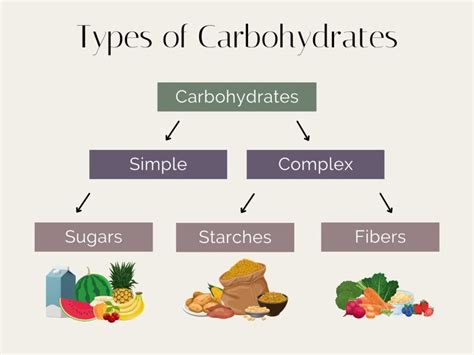
Carbohydrates can be classified into two main categories: simple and complex. Simple carbohydrates, also known as sugars, are found in foods such as fruits, dairy products, and refined sugars. They are quickly digested and absorbed by the body, providing a rapid source of energy. Complex carbohydrates, on the other hand, are found in whole, unprocessed foods such as whole grains, vegetables, and legumes. They are digested and absorbed more slowly, providing a sustained release of energy.
Simple Carbohydrates
Simple carbohydrates are composed of one or two sugar molecules and are quickly digested by the body. Examples of simple carbohydrates include: * Fructose (found in fruits and honey) * Glucose (found in fruits, vegetables, and grains) * Lactose (found in dairy products) * Sucrose (found in refined sugars)Complex Carbohydrates
Complex carbohydrates are composed of three or more sugar molecules and are digested and absorbed more slowly by the body. Examples of complex carbohydrates include: * Starches (found in whole grains, legumes, and vegetables) * Fiber (found in whole grains, fruits, and vegetables) * Glycogen (found in animal tissues and liver)Food Sources of Carbohydrates
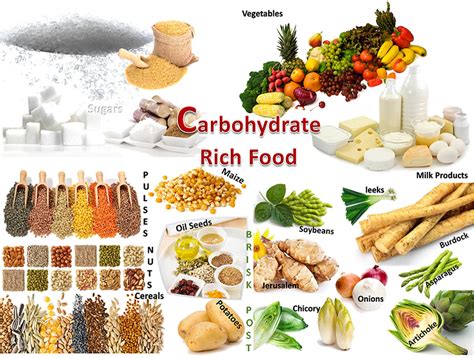
Carbohydrates are found in a wide variety of foods, including grains, fruits, vegetables, and dairy products. Here are some examples of carbohydrate-rich foods:
- Grains: whole wheat bread, brown rice, quinoa, whole grain pasta
- Fruits: apples, bananas, berries, citrus fruits
- Vegetables: broccoli, carrots, sweet potatoes, leafy greens
- Legumes: beans, lentils, chickpeas, peas
- Dairy products: milk, yogurt, cheese, ice cream
Whole Grains
Whole grains are rich in complex carbohydrates, fiber, and essential nutrients. Examples of whole grains include: * Whole wheat bread * Brown rice * Quinoa * Whole grain pasta * OatsFruits and Vegetables
Fruits and vegetables are rich in simple carbohydrates, fiber, and essential nutrients. Examples of fruits and vegetables include: * Apples * Bananas * Berries * Citrus fruits * Broccoli * Carrots * Sweet potatoes * Leafy greensBenefits of Carbohydrates
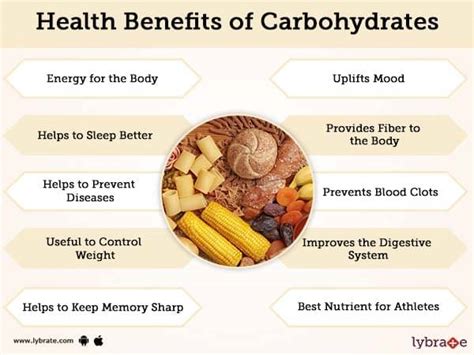
Carbohydrates provide numerous health benefits, including:
- Energy production: Carbohydrates are the body's primary source of energy.
- Weight management: Carbohydrates help to regulate appetite and support healthy weight management.
- Digestive health: Carbohydrates help to regulate bowel movements and prevent constipation.
- Healthy gut bacteria: Carbohydrates support the growth of beneficial gut bacteria.
- Brain function: Carbohydrates are essential for the proper functioning of the brain and nervous system.
Importance of Fiber
Fiber is a type of complex carbohydrate that is essential for maintaining healthy digestion and preventing constipation. Fiber-rich foods include: * Whole grains * Fruits * Vegetables * LegumesCarbohydrate Intake and Health
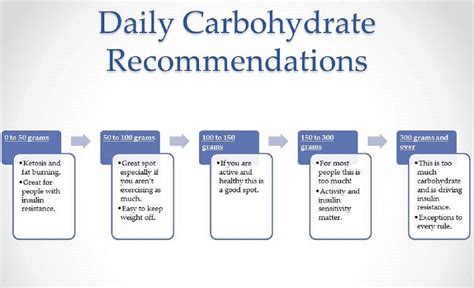
The amount and type of carbohydrates we consume can have a significant impact on our overall health. Consuming high amounts of refined and processed carbohydrates can lead to a range of health problems, including:
- Obesity
- Type 2 diabetes
- Heart disease
- Certain types of cancer
On the other hand, consuming a balanced diet that includes a variety of whole, unprocessed foods can provide numerous health benefits, including:
- Weight management
- Improved blood sugar control
- Reduced risk of chronic diseases
- Improved overall health and well-being
Carbohydrate Quality and Quantity
The quality and quantity of carbohydrates we consume are essential for maintaining healthy blood sugar levels and preventing chronic diseases. Here are some tips for choosing high-quality carbohydrates: * Choose whole, unprocessed foods whenever possible. * Limit intake of refined and processed carbohydrates. * Pay attention to portion sizes and control carbohydrate intake. * Choose carbohydrates that are rich in fiber and essential nutrients.Practical Tips for Carbohydrate Consumption
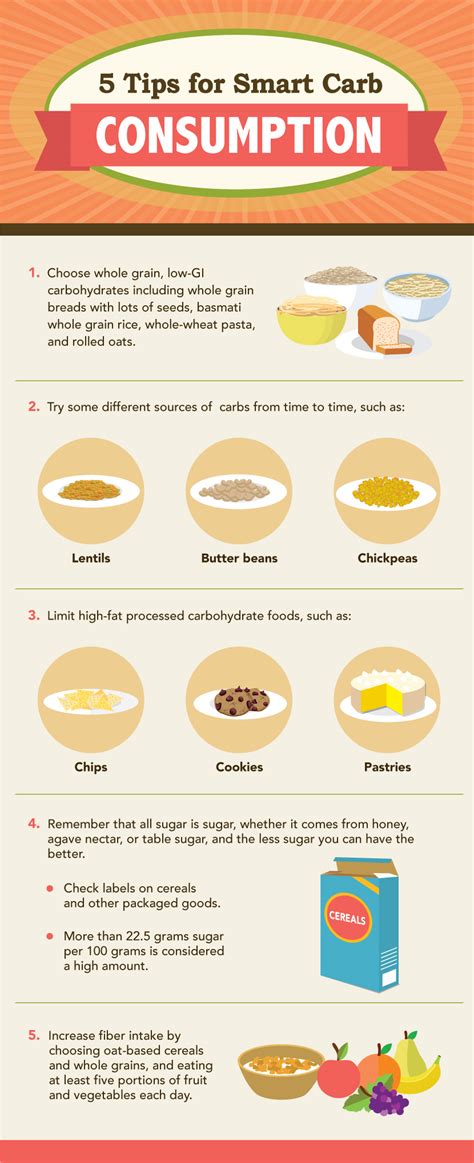
Here are some practical tips for carbohydrate consumption:
- Eat a variety of whole, unprocessed foods to ensure adequate carbohydrate intake.
- Choose carbohydrates that are rich in fiber and essential nutrients.
- Limit intake of refined and processed carbohydrates.
- Pay attention to portion sizes and control carbohydrate intake.
- Consider consulting with a healthcare professional or registered dietitian for personalized nutrition advice.
Meal Planning and Carbohydrate Intake
Meal planning can help to ensure adequate carbohydrate intake and prevent overconsumption of refined and processed carbohydrates. Here are some tips for meal planning: * Plan meals in advance to ensure adequate carbohydrate intake. * Choose a variety of whole, unprocessed foods. * Limit intake of refined and processed carbohydrates. * Consider consulting with a healthcare professional or registered dietitian for personalized nutrition advice.What are the main sources of carbohydrates in the diet?
+The main sources of carbohydrates in the diet are grains, fruits, vegetables, and dairy products.
What is the difference between simple and complex carbohydrates?
+Simple carbohydrates are composed of one or two sugar molecules and are quickly digested by the body, while complex carbohydrates are composed of three or more sugar molecules and are digested and absorbed more slowly.
Why is fiber an essential nutrient?
+Fiber is an essential nutrient because it helps to regulate bowel movements, prevent constipation, and support the growth of beneficial gut bacteria.
In conclusion, carbohydrates are an essential nutrient that provides energy for the body and supports overall health and well-being. By understanding the different types of carbohydrates, their food sources, and the benefits of carbohydrate consumption, individuals can make informed choices about their diet and maintain a healthy lifestyle. Remember to choose whole, unprocessed foods whenever possible, limit intake of refined and processed carbohydrates, and pay attention to portion sizes to ensure adequate carbohydrate intake. By following these tips and consulting with a healthcare professional or registered dietitian, individuals can optimize their carbohydrate consumption and support overall health and well-being. We encourage you to share this article with others, comment below with your thoughts, and take the first step towards a healthier lifestyle by making informed choices about your carbohydrate intake.
